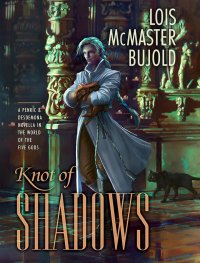Paul Di Filippo Reviews Knot of Shadows by Lois McMaster Bujold and After Many a Summer by Tim Powers
 Knot of Shadows, Lois McMaster Bujold (Subterranean 978-1-64524-114-0, hardcover, 160pp, $45.00) January 2023.
Knot of Shadows, Lois McMaster Bujold (Subterranean 978-1-64524-114-0, hardcover, 160pp, $45.00) January 2023.
It’s time for another nigh-aleatory pairing of two novellas, as we dip into the current state of this fascinating artform, which, it has been said, is almost ideal for works of fantastika: long enough for worldbuilding and deep speculations; short enough not to grow wearisome or bogged down.
Today’s offerings both come from the fabulous Subterranean Press, which rides shoulder to shoulder with Tor, PS Publishing, and NewCon Press as one of the premier outlets for this format.
My ideal stance when approaching a book, if it’s part of a series, is to know as much as possible about its predecessors. But sometimes that’s just not practical. Bujold’s World of the Five Gods saga began in 2001, and now amounts to several novels and about a dozen novellas, none of which I have been privileged to sample previously. So I dive into her newest as a total novice, holding fast to the principle that “Every book could be someone’s first encounter with the writer.”
I am pleased to report—not a big surprise—that Bujold makes entry to her universe easy, and that the reading experience was totally satisfying, despite my ignorance of the backstory.
In the city of Vilnoc lives Penric, a Learned sorcerous adept serving one of the very real gods of this universe. He’s married and a father, and also happens to host a kindly and helpful “demon” spirit named Desdemona, who offers him extrasensory powers and advice.
One day Penric is summoned by the authorities to advise about a peculiar corpse. Initially deemed totally dead after being fished from the harbor, the body has suddenly come alive in zombie fashion: no traditional vital signs except being animated magically by some foreign spirit. Penric quickly diagnoses possession by a ghost, a rare but not unknown phenomenon. But whose ghost, exactly, and why has this curse been levied against the corpse? The resulting investigation, aided by his protégé Alixtra (who is likewise carrying a handy demon advisor) takes the pair all over the city, from high strata to low, and a cat’s cradle of interlocking relationships is gradually revealed—including embezzlement and a second possessed corpse!—until Penric is able to put everything right.
From this synopsis you might guess that Bujold has gifted us with a detective story/fantasy story hybrid, and indeed she has. Shades of Lord Darcy. She plays totally fair with the reader, pulling no extraneous magic tricks from her bag, and the resolution of the enigma is clean and logical. However, you should prepare yourself for a rather cozy experience, given the levels of domesticity and the mainly familial settings involved. This is not Hammett or Chandler territory, with murder and bludgeonings galore, but rather more like the cerebral investigations of Nero Wolfe or Gideon Fell. There is a rather melancholy, fated tone to the case, rather than any high suspense.
But the city comes alive, as do the peculiar and esoteric relations of the gods to the mortals. There are some gripping and emotionally resonant passages, such as Penric’s descent into a sewer. And the citizenry of Vilnoc are paraded in all their eccentric individuality. A nice coda with two old reprobate sailors stands out.
I did feel that the character of Alixtra was a tad underused, and even perhaps a shade redundant. Her talents mirror Penric’s exactly, except to a lesser degree. Having an assistant that exhibited more of a complementary nature might enliven things. If I may make an analogy: having two vampires fighting crime is neat; having a vampire paired with a werewolf as a crimefighting team is potentially more fraught and exciting.
Bujold’s easy-going and accomplished prose and her honed story-telling chops ensure that her World of the Five Gods will continue to entice and entertain, some twenty years into its unfolding.
 After Many a Summer, Tim Powers (Subterranean 978-1-64524-125-6, hardcover, $40.00) Spring 2023.
After Many a Summer, Tim Powers (Subterranean 978-1-64524-125-6, hardcover, $40.00) Spring 2023.
Has Tim Powers ever written a bad book? I’ve read all his work except for his two earliest publications, and never yet seen him produce a stinker. His batting average remains exceptionally high for any writer, never mind one who has been active for forty-five years.
Certainly his new standalone tale is no exception to this sterling track record. It’s got bedazzlement, thrills, great characters, and the unpredictability of real life, as well as a metaphysical engine for the action.
One trademark allure of Powers’s work is the blend of tactile sunny California realism and mimesis with the vibrantly deranged occult, and this tale delivers such a combo in plenty.
We open on our protagonist, a fellow named Conrad, as he sits in a parking lot, awaiting the fulfillment of some mysterious assignment. Conrad, an ex-screenwriter, has been a homeless alcoholic for some time now, but feels that this occasion—doing a favor for Satkin, the powerful head of Doheny Studios—might be his leg up on regaining respectability. (Curiously enough, I just happened to read The Gutter and the Grave, by Ed McBain, where the hero was also a hardcore homeless alcoholic struggling to reassert his ethical self. I wonder if Powers knows that book?) All Conrad has to do is to take over a delivered car and its enigmatic cargo and drive it to a rendezvous with Satkin. Easy-peasey.
But of course Conrad makes the mistake of looking at the prize he is to deliver, and discovers it to be an oracular quasi-living automaton of sorts. And when the talking head gets inside Conrad’s head, all bets are off.
Meanwhile we get introduced to a woman named Arielle, who happens to be the kidnapped leverage that Satkin is using to get the prize. Will she be freed or executed? If her staunch bravery and keen wits have anything to do with her fate, she’ll escape. With Conrad’s help or without.
But what neither character suspects is that the ancient undead oracle called Tithonus might contrive for multiple fates to overtake them simultaneously.
Powers’s noir stylings are topnotch here, with Satkin and motley crew being real mooks. His evocation of the L.A. landscape is palpable. The ultra-compressed timeframe of the tale—it all happens within the space of a few hours—is propulsive. And the portraits of Conrad and Arielle are shaded with granular finesse. Oh, and did I mention that the novel manages to pay homage to the themes and topics in Aldous Huxley’s book of the same name? Not bad for eighty-four pages of compact story-telling.
These two offerings show the novella flourishing in all its diverse strengths, and contribute to making this the Golden Age for such snack-sized delights.
 While you are here, please take a moment to support Locus with a one-time or recurring donation. We rely on reader donations to keep the magazine and site going, and would like to keep the site paywall free, but WE NEED YOUR FINANCIAL SUPPORT to continue quality coverage of the science fiction and fantasy field.
While you are here, please take a moment to support Locus with a one-time or recurring donation. We rely on reader donations to keep the magazine and site going, and would like to keep the site paywall free, but WE NEED YOUR FINANCIAL SUPPORT to continue quality coverage of the science fiction and fantasy field.
©Locus Magazine. Copyrighted material may not be republished without permission of LSFF.







